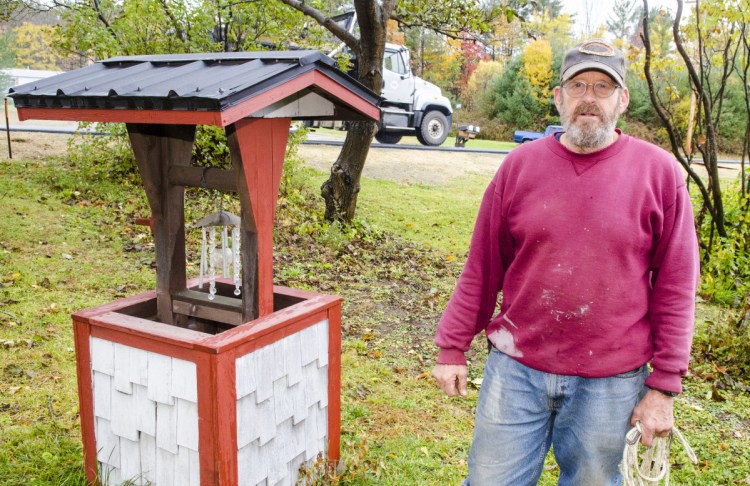BELGRADE — Several property owners with private wells along Oakland Road in Belgrade are detecting rising levels of chloride that they and the state attribute to runoff from road salt.
David H. Riddle, for instance, has seen the chloride content of his well rise from 400 milligrams per liter in May to 1,200 milligrams per liter in September.
The public drinking water threshold is 250 milligrams per liter.
He and two other nearby property owners are getting deliveries of bottled water from the state as they await new wells, which Dwight Doughty, hydrogeologist with the state Department of Transportation, hopes will be the final solution to the salt problem.
He said it appeared road salt had washed off the road and gotten into the bedrock, which is close to the surface in that area, so there’s little chance for the salt to spread out.
“What we’re waiting for is the end of the (Oakland Road) reconstruction project,” Doughty said.
The project is aimed at enhancing and improving surface drainage so new wells can be less vulnerable to salt contamination.
“The long-term prospects are favorable because of the change in the drainage system,” Doughty said. “It will move the road runoff into an area that is not currently developed.”
The state is supplying bottled water to a handful of other residents whose homes are in a triangular area bordered by Augusta, Oakland and Cemetery roads. The salt contamination there is traced to formerly uncovered road salt piles kept by the town and the state just off Cemetery Road.
However, chloride contamination of wells farther along Oakland Road – such as Riddle’s – is unrelated to the salt storage piles, Doughty said.
Riddle, who has lived at 211 Oakland Road for about 40 years, saw firsthand evidence of the high salt content back in the spring after he ran the dishwasher.
“I went to take it out the next day, and on all the dishes and glasses and silverware, it looked like it was frosted up like the windows in your car,” he said. “I had to take an SOS pad to scrub it to get it off.”
He had previous problems with chloride in his well, which he also attributes to road salt, and which he solved by having a new well drilled.
Riddle said he thinks the road salt contributed to the rusting of his old well cap. His well head was close to the road, and his house is 25 feet from the edge of the tar.
“This is all ledge,” Riddle said Tuesday.
Because the area has so much ledge, he said, he has felt the effects of the blasting being done for road reconstruction near his home.
At one point, Riddle said, he was in his basement when “I felt the blast in my feet. It wasn’t too bad.”
“When they got up the road in front of my neighbor’s and across the street (and blasted),” he said, “those rattled my teeth.”
Riddle said the state has been responsive and keeping up with testing the water.
“I guess they’re doing it right,” he said.
David Leigh, who lives farther out Oakland Road, said his family independently had begun getting bottled water after the start of the road construction blasting.
“It had such a foul odor and a foul taste,” he said Oct. 18, referring to his well water.
Now the Leighs, like a dozen or so other households along the road, also receive bottled water from the state.
“We’re just waiting (for the well) to be tested when all this is over,” Leigh said.
Doughty said the department has “been trying to be transparent with all the property owners,” adding that DOT workers notify property owners that they have a right to file a well claim if there is a problem. He said many times the state finds the problem and then notifies the owners, which happened with the Oakland Road properties.
“If it is determined we are responsible we take actions to resolve the concern,” Doughty said.Doughty said that once the new wells are drilled, the state will continue monthly water testing for about six months and then move to a quarterly monitoring schedule.
Send questions/comments to the editors.



